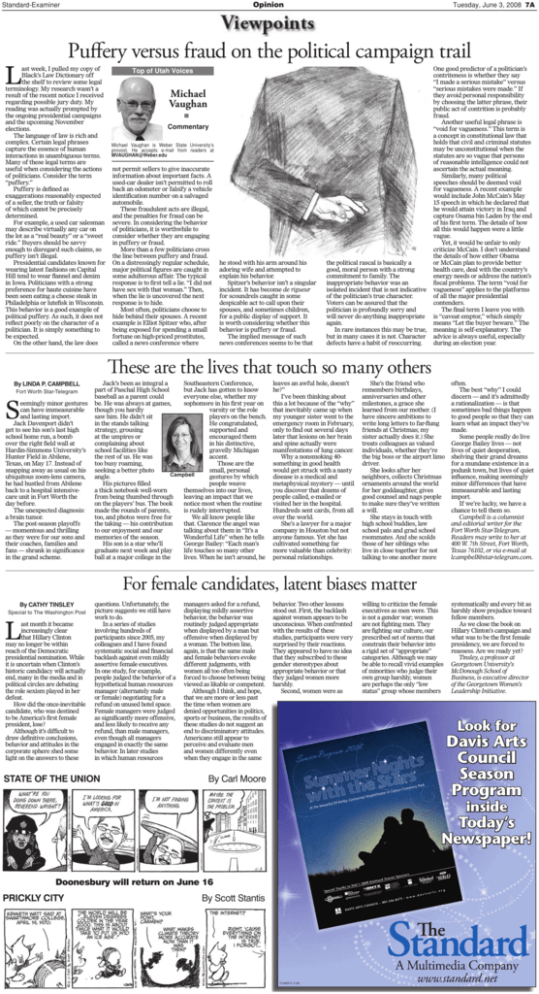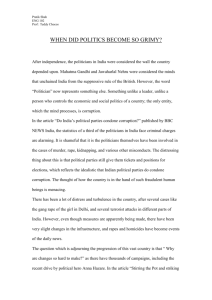Puffery versus fraud on the political campaign trail
advertisement

Opinion Standard-Examiner ... L Tuesday, June 3, 2008 7A Puffery versus fraud on the political campaign trail ast week, I pulled my copy of Top of Utah Voices Black’s Law Dictionary off the shelf to review some legal terminology. My research wasn’t a result of the recent notice I received regarding possible jury duty. My reading was actually prompted by the ongoing presidential campaigns and the upcoming November Commentary elections. The language of law is rich and complex. Certain legal phrases Michael Vaughan is Weber State University’s capture the essence of human provost. He accepts e-mail from readers at MVAUGHAN@Weber.edu interactions in unambiguous terms. Many of these legal terms are not permit sellers to give inaccurate useful when considering the actions information about important facts. A of politicians. Consider the term used-car dealer isn’t permitted to roll “puffery.” back an odometer or falsify a vehicle Puffery is defined as identification number on a salvaged exaggerations reasonably expected of a seller, the truth or falsity automobile. These fraudulent acts are illegal, of which cannot be precisely and the penalties for fraud can be determined. For example, a used car salesman severe. In considering the behavior of politicians, it is worthwhile to may describe virtually any car on consider whether they are engaging the lot as a “real beauty” or a “sweet ride.” Buyers should be savvy in puffery or fraud. More than a few politicians cross enough to disregard such claims, so the line between puffery and fraud. puffery isn’t illegal. Presidential candidates known for On a distressingly regular schedule, major political figures are caught in wearing latest fashions on Capital some adulterous affair. The typical Hill tend to wear flannel and denim in Iowa. Politicians with a strong response is to first tell a lie. “I did not have sex with that woman.” Then, preference for haute cuisine have when the lie is uncovered the next been seen eating a cheese steak in Philadelphia or lutefisk in Wisconsin. response is to hide. Most often, politicians choose to This behavior is a good example of hide behind their spouses. A recent political puffery. As such, it does not example is Elliot Spitzer who, after reflect poorly on the character of a being exposed for spending a small politician. It is simply something to fortune on high-priced prostitutes, be expected. called a news conference where On the other hand, the law does Michael Vaughan By Linda P. Campbell Fort Worth Star-Telegram S eemingly minor gestures can have immeasurable and lasting import. Jack Davenport didn’t get to see his son’s last high school home run, a bomb over the right field wall at Hardin-Simmons University’s Hunter Field in Abilene, Texas, on May 17. Instead of snapping away as usual on his ubiquitous zoom-lens camera, he had hustled from Abilene back to a hospital intensivecare unit in Fort Worth the day before. The unexpected diagnosis: a brain tumor. The post-season playoffs — momentous and thrilling as they were for our sons and their coaches, families and fans — shrank in significance in the grand scheme. he stood with his arm around his adoring wife and attempted to explain his behavior. Spitzer’s behavior isn’t a singular incident. It has become de rigueur for scoundrels caught in some despicable act to call upon their spouses, and sometimes children, for a public display of support. It is worth considering whether this behavior is puffery or fraud. The implied message of such news conferences seems to be that the political rascal is basically a good, moral person with a strong commitment to family. The inappropriate behavior was an isolated incident that is not indicative of the politician’s true character. Voters can be assured that the politician is profoundly sorry and will never do anything inappropriate again. In rare instances this may be true, but in many cases it is not. Character defects have a habit of reoccurring. One good predictor of a politician’s contriteness is whether they say “I made a serious mistake” versus “serious mistakes were made.” If they avoid personal responsibility by choosing the latter phrase, their public act of contrition is probably fraud. Another useful legal phrase is “void for vagueness.” This term is a concept in constitutional law that holds that civil and criminal statutes may be unconstitutional when the statutes are so vague that persons of reasonable intelligence could not ascertain the actual meaning. Similarly, many political speeches should be deemed void for vagueness. A recent example would include John McCain’s May 15 speech in which he declared that he would attain victory in Iraq and capture Osama bin Laden by the end of his first term. The details of how all this would happen were a little vague. Yet, it would be unfair to only criticize McCain. I don’t understand the details of how either Obama or McCain plan to provide better health care, deal with the country’s energy needs or address the nation’s fiscal problems. The term “void for vagueness” applies to the platforms of all the major presidential contenders. The final term I leave you with is “caveat emptor,” which simply means “Let the buyer beware.” The meaning is self-explanatory. The advice is always useful, especially during an election year. These are the lives that touch so many others Southeastern Conference, Jack’s been as integral a but Jack has gotten to know part of Paschal High School baseball as a parent could everyone else, whether my sophomore in his first year on be. He was always at games, varsity or the role though you hardly saw him. He didn’t sit players on the bench. He congratulated, in the stands talking supported and strategy, grousing encouraged them at the umpires or in his distinctive, complaining about gravelly Michigan school facilities like accent. the rest of us. He was Those are the too busy roaming, small, personal seeking a better photo Campbell gestures by which angle. people weave His pictures filled themselves into our lives, a thick notebook well-worn from being thumbed through leaving an impact that we notice most when the routine on the players’ bus. The book is rudely interrupted. made the rounds of parents, too, and photos were free for We all know people like that. Clarence the angel was the taking — his contribution talking about them in “It’s a to our enjoyment and our memories of the season. Wonderful Life” when he tells George Bailey: “Each man’s His son is a star who’ll life touches so many other graduate next week and play lives. When he isn’t around, he ball at a major college in the She’s the friend who remembers birthdays, anniversaries and other milestones, a grace she learned from our mother. (I have sincere ambitions to write long letters to far-flung friends at Christmas; my sister actually does it.) She treats colleagues as valued individuals, whether they’re the big boss or the airport limo driver. She looks after her neighbors, collects Christmas ornaments around the world for her goddaughter, gives good counsel and nags people to make sure they’ve written a will. She stays in touch with high school buddies, law school pals and grad school roommates. And she scolds those of her siblings who live in close together for not talking to one another more leaves an awful hole, doesn’t he?” I’ve been thinking about this a lot because of the “why” that inevitably came up when my younger sister went to the emergency room in February, only to find out several days later that lesions on her brain and spine actually were manifestations of lung cancer. Why a nonsmoking 40something in good health would get struck with a nasty disease is a medical and metaphysical mystery — until you discover that dozens of people called, e-mailed or visited her in the hospital. Hundreds sent cards, from all over the world. She’s a lawyer for a major company in Houston but not anyone famous. Yet she has cultivated something far more valuable than celebrity: personal relationships. often. The best “why” I could discern — and it’s admittedly a rationalization — is that sometimes bad things happen to good people so that they can learn what an impact they’ve made. Some people really do live George Bailey lives — not lives of quiet desperation, shelving their grand dreams for a mundane existence in a podunk town, but lives of quiet influence, making seemingly minor differences that have immeasurable and lasting import. If we’re lucky, we have a chance to tell them so. Campbell is a columnist and editorial writer for the Fort Worth Star-Telegram. Readers may write to her at 400 W. 7th Street, Fort Worth, Texas 76102, or via e-mail at lcampbell@star-telegram.com. For female candidates, latent biases matter By Cathy Tinsley Special to The Washington Post L ast month it became increasingly clear that Hillary Clinton may no longer be within reach of the Democratic presidential nomination. While it is uncertain when Clinton’s historic candidacy will actually end, many in the media and in political circles are debating the role sexism played in her defeat. How did the once-inevitable candidate, who was destined to be America’s first female president, lose? Although it’s difficult to draw definitive conclusions, behavior and attitudes in the corporate sphere shed some light on the answers to these questions. Unfortunately, the picture suggests we still have work to do. In a series of studies involving hundreds of participants since 2005, my colleagues and I have found systematic social and financial backlash against even mildly assertive female executives. In one study, for example, people judged the behavior of a hypothetical human resources manager (alternately male or female) negotiating for a refund on unused hotel space. Female managers were judged as significantly more offensive, and less likely to receive any refund, than male managers, even though all managers engaged in exactly the same behavior. In later studies in which human resources STATE OF THE UNION managers asked for a refund, displaying mildly assertive behavior, the behavior was routinely judged appropriate when displayed by a man but offensive when displayed by a woman. The bottom line, again, is that the same male and female behaviors evoke different judgments, with women all too often being forced to choose between being viewed as likable or competent. Although I think, and hope, that we are more or less past the time when women are denied opportunities in politics, sports or business, the results of these studies do not suggest an end to discriminatory attitudes. Americans still appear to perceive and evaluate men and women differently even when they engage in the same behavior. Two other lessons stood out. First, the backlash against women appears to be unconscious. When confronted with the results of these studies, participants were very surprised by their reactions. They appeared to have no idea that they subscribed to these gender stereotypes about appropriate behavior or that they judged women more harshly. Second, women were as willing to criticize the female executives as men were. This is not a gender war; women are not fighting men. They are fighting our culture, our prescribed set of norms that constrain their behavior into a rigid set of “appropriate” categories. Although we may be able to recall vivid examples of minorities who judge their own group harshly, women are perhaps the only “low status” group whose members systematically and every bit as harshly show prejudice toward fellow members. As we close the book on Hillary Clinton’s campaign and what was to be the first female presidency, we are forced to reassess. Are we ready yet? Tinsley, a professor at Georgetown University’s McDonough School of Business, is executive director of the Georgetown Women’s Leadership Initiative. Look for Davis Arts Council Season Program 008 ogram 2 easonPr S alcr li�, By Carl Moore tiful Ed beau at the Kenley nia Centen ns Park ommo yton C ter in La ithea l Amph ,%je inside Today’s Newspaper! Doonesbury will return on June 16 PRICKLY CITY S p e ci By Scott Stantis an al Th ks to 2008 D A C ’s ARTS D A V IS D ia m COUN e a so ond S 8 0 1 .5 C IL – n n Spo 46 so rs rg ts.o isar dav w w. w – .8 5 7 5 Åt l 9.. 514605 6-3-08 49







